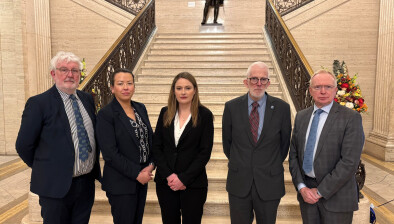NI High Court: Farmer’s claim for proprietary estoppel dismissed

Northern Ireland’s High Court has dismissed a son’s claim for proprietary estoppel in respect of farmlands which were the subject of his father’s will.

About this case:
- Citation:[2024] NICh 1
- Judgment:
- Court:NI High Court
- Judge:Mr Justice Ian Huddleston
Delivering judgment for the High Court, Mr Justice Ian Huddleston observed: “What this case boils down to is the fact that the plaintiff had formed his own view that it would be (to use his words) ‘odd’ for anyone other than him to benefit from the land because he had farmed it during his lifetime and that neither his sisters nor their children were actively engaged in the farming enterprise. He assumed that he would benefit from primogeniture. No one represented to him that that would be the case.”
Background
The plaintiff came from a farming family, and having left school in late 1968, he started to work in the farm business in 1969. The plaintiff suggested that he had formed a farming partnership with his father from 1970 onwards.
In addition to the lands solely owned by his father, lands were acquired which were conveyed into the joint names of the plaintiff and his father. A number of other land acquisitions and sales took place prior to the death of the plaintiff’s father, leading to a sizeable estate and considerable investments arising from land sales proceeds.
The plaintiff alleged that his father represented to him that upon his death, his father’s interest in the jointly owned farmlands together with the lands solely owned by his father would pass to him. The plaintiff claimed that in order for the farming enterprise to continue to flourish, he and his son must have ownership of all the lands.
The deceased attended his solicitor in 2003 to make a will. A will from that period could not be located, but the solicitor’s attendance note documenting the discussions that took place records the possibility of “further development potential”, the deceased’s desire to give his wife a life interest in the dwelling and yard at the home farm with a gift in remainder to his grandson, and to provide for his two daughters and the plaintiff.
In 2007, the deceased made a will which appointed the plaintiff and his solicitor as executors and which made gifts of a dwelling and yard to his wife, with a gift in default to the plaintiff’s sister, the second defendant, and the remainder of the lands, yard and outbuildings to his wife with a gift in remainder to the plaintiff. The will also gifted 19 acres of land to his second defendant, 32 acres to all three children as tenants in common in equal shares, and left cash assets and investments to his wife and daughters in equal shares. The residue of the state went to the plaintiff absolutely.
The deceased’s wife made a will on the same date leaving her estate and interest in the dwelling to the second defendant, and the residue of her estate (including cash and investments) to the plaintiff.
The High Court
Mr Justice Huddleston considered the principles of estoppel as set out in Uglow v Uglow [2004] EWCA Civ 987, finding that the onus “falls to the plaintiff to establish the representations which were made by the late Mr Irvine and which he says are now unconscionable such as would engage those principles and equitable relief. The issues of what constitutes a representation, what amounts to detriment and what constitutes reliance are well-trammelled in these courts.”
The court noted that the plaintiff had “difficulties” as the “height of his oral evidence to the court was that it was the ‘furthest thought’ from the plaintiff’s own head that anything other than primogeniture would arise in respect of the land now in dispute… The plaintiff’s supposition is not, however, by any stretch of the imagination, a representation made by the deceased upon which he can rely.”
Mr Justice Huddleston examined what he believed to be the only material example of a representation to the plaintiff, in which the plaintiff’s father alleged told him in the course of a dispute between them about the plaintiff’s absence for his honeymoon that “at the end of the day, it would more or less all be yours anyway”. The judge found that “this 1981 spat — and the deceased’s reaction to it — appears to be the only specific representation upon which the plaintiff now seeks to rely. His evidence about ‘other’ representations simply confirmed to me that the plaintiff laboured in the main under his own supposition as to primogeniture rather than on any assertion or course of conduct on the part of his father, the deceased.”
The judge found it clear from the instructions for the 2003 will and the content of the 2007 will “that the deceased clearly had formed the view that those lands which were farmed in partnership (and jointly owned) should continue as part of the business and that it was the business that should pass to the plaintiff. I do not detect that he felt any compunction whatsoever in relation to the lands which remain vested in his sole name and in respect of which he asserted his right to freedom of testamentary disposition as was his entitlement.”
Mr Justice Huddleston also opined that he could “see no detriment on the facts of this case. I can see none suffered by the plaintiff — other than the deflation of his hope of expectation that the deceased was bound in some fashion, to adhere to the rules of primogeniture. He was not. The reality is that after the plaintiff’s admission to the farming partnership all of the lands which were acquired from the profits of the business were bought in joint names.”
Equally, the judge could find no unconscionable conduct on part of the deceased, who as “simply trying to provide a degree of equality as between the continuation of the business, making provision for his wife and his daughters and grandchildren”.
Conclusion
Remarking that the plaintiff “may not like the outcome of the testamentary wishes of his father, but in no way, can they be regarded as unconscionable”, the High Court dismissed the claim.
John Robert Irvine and Gerard F Drain (as executor of the estate of Robert John Irvine (Deceased)) and Gillian Napier and Heather Verner [2024] NICh 1










